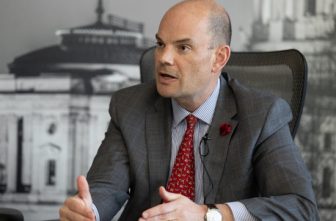 Name: Kevin Conneely
Name: Kevin Conneely
Age: 60
Spouse: Katie
Home Parish: Annunciation in Minneapolis
Residence: Minneapolis
Profession: Attorney
Children: Two adult daughters
Birthplace: Sterling, Illinois
Q) What inspired you to pursue the diaconate?
A) In various roles as a volunteer in the archdiocese, I have seen the great need for more vocations, grounded in the sacramental life of the Church. It started, subconsciously at first, when I was asked by Bishop (Richard) Pates over 20 years ago to be on the Board of The St. Paul Seminary. I saw how all members of God’s Church — bishops, clergy and laity — need to work together to promote vocations. Only years later did that seed, planted in the 1990s, germinate into my own calling to explore being a deacon.
Q) What made you certain this was your call?
A) I received great encouragement from people I trust and who know me. On hearing that I was in formation, they affirmed me with: “You will be a great deacon!” Of course, they were more certain of the matter than I could be. For me, the certainty came around year three, when the classwork and prayer life and practical training all had a chance to take deep root in me and in my wife.
Q) What aspect of diaconate ministry are you most looking forward to?
A) Parish life is at the center of the sacramental, teaching and kingdom-building aspects of our local Church. I look forward to any parish assignment I may receive.
Q) What areas of ministry are you especially interested in?
A) Given my background as an attorney, I would be open to helping in a parish or at the diocesan level with the kinds of canon law and civil law matters that the Church encounters.
Q) What role will your family play in your new ministry?
A) With our two independent, adult daughters living their own lives, there may not be a lot of day-to-day interaction or role(s) for them to play. As their dad, however, I hope that I can respectfully communicate in preaching and in teaching their feminine points of view. The main support for me as deacon will be from my wife, Katie. After the Holy Spirit, she has played the role of being my “first formator.” She knows me best, and she knows where the boundaries are between our first vocation as a married couple and this new diaconate vocation.
Q) Where do you see the greatest needs in the local Church?
A) I love analogies, and Pope Francis used two good analogies to describe what the Church is, and what it is not. It is a “field hospital” in that it goes out to where the battle is raging and offers healing and support. But the Church also is not, Pope Francis says, an “old people’s club.” Coming out of the COVID pandemic, we have to work extra hard to go out from the Upper Room, as they say, and introduce the ancient and current beauty of the Catholic faith to new generations of Catholics and to young searchers, too.
Q) What part of your formation has been the most rewarding?
A) It’s the realization, over time, that this new vocation in which Katie and I are being formed both builds up — and is built upon — the existing marriage vocation we have lived for 35 years. The gifts to our marriage from our formation experience are plentiful and lasting.
Q) Who has been a model for your ministry?
A) My spiritual director has been a great role model for me. He has helped me see how the daily examination of conscience is a must and how to be patient with myself in my prayer. I also admire our deacons who serve at the Institute for Diaconate Formation (IDF) at The St. Paul Seminary. They give so generously of their time and show so much patience with me. Coming from a professional work background, I have also drawn on the experience of deacons who, after ordination, have found a way to dial back — or leave — the comfort and prestige of their professional lives.
Q) What do you most hope to offer the Church through this vocation?
A) I hope to be an approachable deacon who can use his gifts to help build up both the sacramental life of the parish and the evangelical, teaching and administrative functions of the archdiocese.
Q) What has been the most challenging part of pursuing this vocation?
A) The main challenge has been detachment from work concerns, from financial well-being and my self-image as a professional. I will need to constantly work on greater humility that can free me up for “diakonia” — service to those in need.
Q) What can the Church do to inspire other men to answer the diaconate calling?
A) Promote in the parishes (posters, bulletin articles, pastor announcements) the Discernment Days put on in fall and spring by the IDF at the seminary. I was drawn down this path by those men who over the past 20 years have been like “walking billboards” for how deacons can be effective as servants for Christ. Use Catholic media to promote and honor their lives of service, too.
Q) What advice would you give another man discerning the diaconate?
A) First, find as many deacons as you can and take them to coffee or a beer, and ask them what it is like. Second, attend a Discernment Day now, but be open to applying later on. Third, when some well-meaning parishioner or co-worker asks if you have ever considered becoming a deacon, don’t dismiss them in the moment. Pray about whether their honest question is really the Holy Spirit prodding and urging you on.



